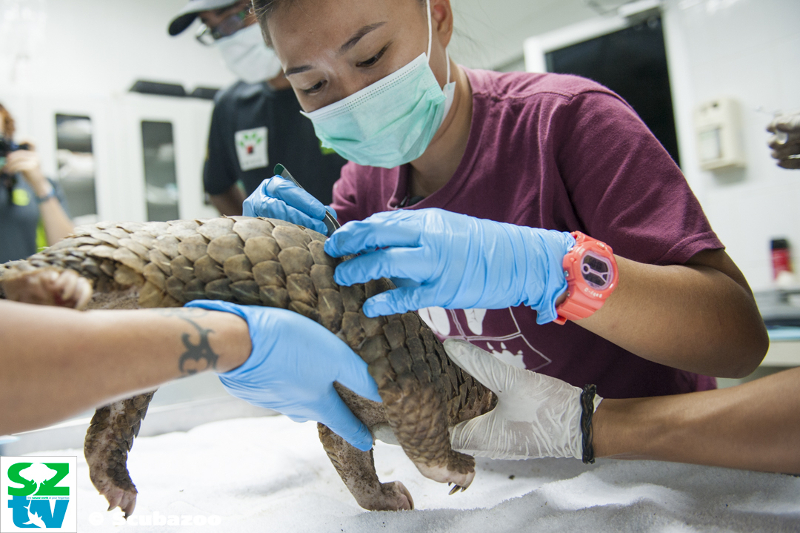KOTA KINABALU, June 12 — Sabah native Elisa Panjang first saw a pangolin in her backyard in Sandakan when she was 10 years old.
Its unusual, scaled appearance and distinctive gait had piqued the young Panjang’s interest, but as she got older and learned more about the world’s most trafficked mammal, it soon became her obsession.
“Now pangolins are my life. I chose to study pangolins because they are so mysterious, elusive and secretive. Sadly, they are also endangered. I think there are many things about them that we don’t know and I am interested to uncover these mysteries as well as be the voice for the species,” said Panjang.
Her research of the Sunda pangolin, one of eight species in the world, is the topic of episode two of a new web series shot in Sabah’s exotic rainforests called Borneo Jungle Diaries.
Distinctive not just because of her trademark top knot as she trudges through the jungle, Panjang is also the only Malaysian studying the Sunda Pangolin here. She is doing her doctorate on pangolin ecology and behaviour studies, and she already holds a degree in Conservation Biology and Ecological Processes as well as a diploma in Civil Engineering.
“I started my study on pangolins in 2011 so it’s almost seven years now. Working with poachers is not new to me. I am also a Sabah Wildlife Department Honorary Wildlife Warden so I sometimes patrol known hotspots where poachers wander.”
Patrolling is necessary as pangolins are highly sought for their scales and meat; some can fetch a staggering US$7,000 (approximately RM30,000) per head.

The pessimism surrounding the species is not misplaced, given recent news of such as the seizure of 6.2 tonnes of frozen pangolin meat in Vietnam. In Sabah, authorities seized records from a syndicate that was believed to have sourced 22,000 Sunda pangolins in just two years.
In December 2011, a newly-formed Special Marine squad seized 178 containers holding 1,068 frozen pangolins worth US$1.26 million – Sabah’s largest ever seizure of pangolin meat – making it part of the 23,400 pangolins confiscated worldwide between 2011 and 2013 alone.
“Sabah is considered one of the hotspots for smuggling, like a point for our pangolins and also other pangolins from the Philippines forward to Vietnam and China. So for me, enforcement, education and research is what we need to do to get more information, and this is very important,” she said.
The Sunda pangolin, the only species found in Sabah, is protected under Schedule 2 of the Wildlife Conservation Enactment 1997, meaning any hunting or possession requires a licence. Unlicensed hunting is punishable with a maximum of five years’ jail, a fine of up to RM50,000 or both.
The IUCN estimated over one million pangolins were killed for meat and scales over the last decade.
“I am a member of the IUCN Specialist Group on pangolins so I know this is true… it’s really bad and then in Sabah, despite it being protected, the authorities still find people capturing them at road blocks,” Panjang said.
But all these known reports are likely just the tip of the iceberg that is the mushrooming illegal trade, and little has been done to combat the depleting population.
Captive breeding has proven to be difficult for the pangolins and breeding in the wild is limited to just one offspring per year, not nearly enough to replace the population lost at the current rate.
“To add to the problem, even conservationists tend not to give focus to this solitary, nocturnal creature as they are preoccupied with bigger, more famous species like the elephants which are being killed at 35,000 per year for ivory and the rhinos being slaughtered at 810 heads per year.
“It is really sad because right now pangolins are unpopular, not many people know about it, people don’t understand them and then we are losing them rapidly while the world still don’t know about them.”

Watch Panjang in the new web series Borneo Jungle Diaries hosted by environmental photojournalist, Aaron ‘Bertie’ Gekoski, as he journeys with her to tag a Sunda pangolin for the first time ever in the jungles of Borneo.
Viewers can also win a 4-day/3-night stay the Danau Girang Field Centre by answering questions from the series. For more information, check out http://www.scubazoo.tv/borneo-jungle-diaries/





















